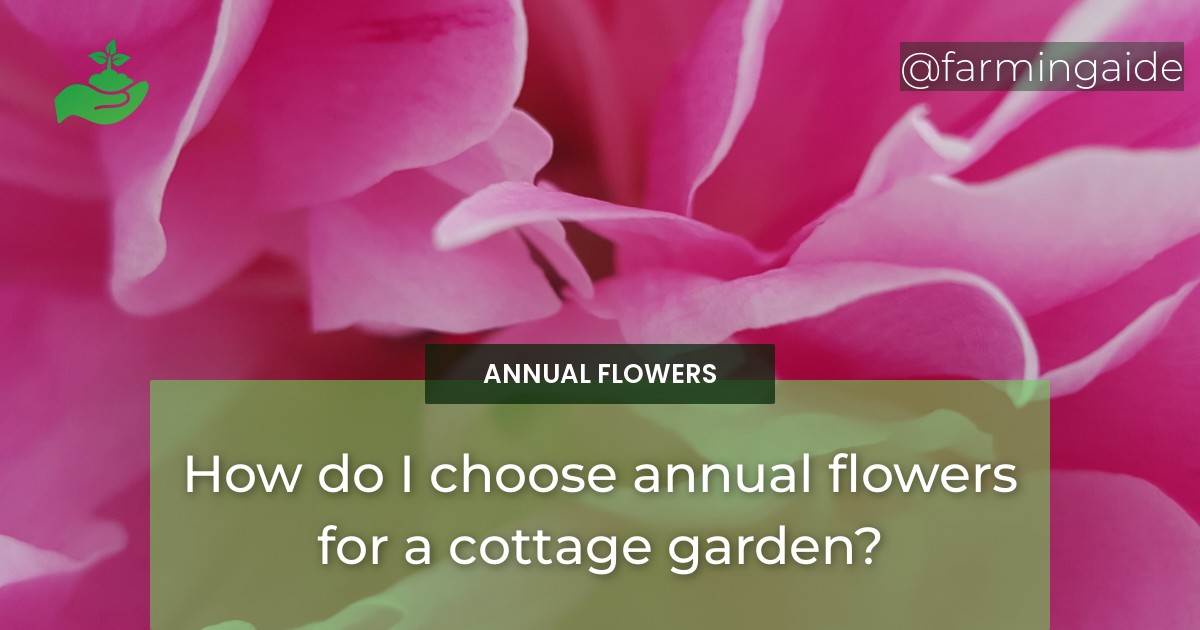When it comes to choosing annual flowers for a cottage garden, there are several factors to consider in order to create a beautiful and casual style garden that is also functional. The right selection of flowers can create a charming and inviting atmosphere that complements the home and surrounding landscape.
Can the Same Annual Flowers Be Used for Both a Container Garden and a Cottage Garden?
Yes, the best annual flowers for a container garden can also be used in a cottage garden. Flowers like petunias, geraniums, and begonias are versatile and can thrive in both settings. Their vibrant colors and low maintenance make them ideal for adding beauty to any garden space.
How to Choose Annual Flowers for a Cottage Garden
Factors to Consider when Selecting Annual Flowers for a Cottage Garden
Before selecting annual flowers, it is important to consider the following factors:
Climate and Weather Conditions
Choose flowers that are adapted to the climate and weather conditions of your area. Consider the average temperature, rainfall, and humidity levels when choosing plants that can thrive in your garden.
Soil Type and Fertility
Annual flowers require well-drained soil with good fertility. Consider the type of soil in your garden and amend it with organic matter and nutrients if needed to ensure the best growing conditions for your flowers.
Sun and Shade Exposure
Choose flowers that match the amount of sunlight your garden receives each day. Some plants require full sun, while others grow best in partial or full shade.
Flower Colors and Combinations
Determine the color scheme and combinations of flowers that will complement your home and surrounding landscape. Choose colors that harmonize with the colors of your home, nearby trees, and other garden elements.
Height and Growth Habit
Choose flowers that vary in height and growth habit to create visual interest and balance in your garden. Consider using taller plants in the back of the garden and shorter plants in the front.
Bloom Time and Duration
Choose flowers that bloom at different times throughout the growing season to ensure a continuous display of color and interest in your garden.
Best Annual Flowers for a Cottage Garden
There are several annual flowers that are perfect for a cottage garden. Here are some of the best:
Sweet Alyssum (Lobularia maritima)
- Small, fragrant flowers
- Low growing, ideal for borders and edging
- Blooms in white, pink, and purple
- Thrives in full sun to partial shade
Nasturtium (Tropaeolum majus)
- Edible flowers and leaves
- Bright, vibrant colors
- Creeping or climbing habit
- Thrives in full sun to partial shade
Zinnia (Zinnia elegans)
- Large, showy flowers
- Blooms in a wide range of colors
- Thrives in full sun
- Butterflies and hummingbirds love them
Cosmos (Cosmos bipinnatus)
- Feathery foliage and delicate flowers
- Blooms in shades of pink, purple, and white
- Tall and airy, ideal for back of garden or mixed borders
- Thrives in full sun
Sunflower (Helianthus annuus)
- Large, showy flowers with edible seeds
- Blooms in shades of yellow, red, and brown
- Tall and sturdy, ideal for back of garden or as a focal point
- Thrives in full sun
Marigold (Tagetes erecta)
- Bright, cheerful flowers in shades of yellow, orange, and red
- Easy to grow and care for
- Deer and rabbits dislike them
- Thrives in full sun
Snapdragons (Antirrhinum majus)
- Spike-like flowers in shades of pink, red, and white
- Cold tolerant, ideal for spring and fall planting
- Attracts bees and other pollinators
- Thrives in full sun to partial shade
Petunia (Petunia x hybrida)
- Abundant, trumpet-shaped flowers
- Blooms in a wide range of colors
- Low growing, ideal for hanging baskets and containers
- Thrives in full sun to partial shade
Salvia (Salvia splendens)
- Spike-like flowers in shades of red, pink, and purple
- Attracts hummingbirds and butterflies
- Deer and rabbits dislike them
- Thrives in full sun
Tips for Planting and Maintaining Annual Flowers in a Cottage Garden
Here are some tips for planting and maintaining annual flowers in a cottage garden:
Planting Techniques
- Plant annual flowers after the last frost date in the spring
- Prepare the soil by loosening it and amending it with organic matter and fertilizer
- Water the plants thoroughly after planting
- Follow spacing guidelines on the seed packet or plant label
Watering and Fertilization
- Water deeply and regularly, especially during dry spells
- Fertilize with a balanced fertilizer according to package instructions
- Avoid over-fertilizing, which can lead to leggy growth and reduced flowering
Deadheading and Pruning
- Pinch off spent blooms to encourage more flowers to form
- Prune back leggy growth to promote bushier growth
- Remove diseased or damaged foliage promptly to prevent the spread of disease
Pest and Disease Control
- Monitor plants regularly for signs of pests or disease
- Remove affected plants and dispose of them to prevent the spread of disease
- Use natural or organic pest controls, such as insecticidal soap or neem oil
Overwintering
- Annual flowers will not survive the winter in colder climates
- Remove dead plant debris in the fall to prevent the buildup of disease and pests
- Consider using mulch to protect the soil and any perennials in your garden
Conclusion
Choosing the right annual flowers for a cottage garden can be a fun and rewarding experience. Consider the climate and weather conditions, soil type and fertility, sun and shade exposure, flower colors and combinations, height and growth habit, and bloom time and duration when selecting your plants. Plant and maintain your flowers using proper techniques, and enjoy a beautiful and casual style garden all season long!


